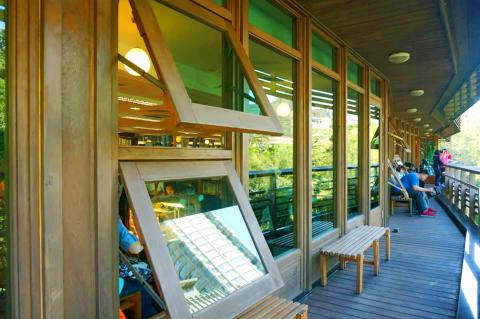Taiwan is known for being a green oasis in Asia. The New York Times has touted initiatives such as the Beitou Public Library’s solar panels which generate electricity and the indoor garden at Da-an Forest Park metro station. But to those of us who live here, the term “green oasis” can sometimes seem far from reality. Beaches and hiking trails are littered with trash and sights like Ma-anshan Nuclear Power Plant (馬鞍山核能發電廠) on Nanwan Beach (南灣) in Pingtung County, for instance, are not just an eyesore, but a constant reminder of potential health risks.
For those interested in learning more about where Taiwan stands in terms of green technologies and economic growth, John Mathews, professor in management at Macquarie University in Sydney and author of the newly-released book Global Green Shift, will speak about the topic at a series of lectures in Taipei and Hsinchu taking place tomorrow and next week and organized by Hu Mei-chih (胡美智), a professor at National Tsing Hua University in Hsinchu.
In his book, Mathews posits that Taiwan was one of the “Asian Tigers” to industrialize rapidly over the last few decades by targeting key industries such as IT and semiconductors, though it’s China that is investing in green infrastructure such as solar farms, wind farms and electric vehicles. Despite this, Mathews sees Taiwan moving away from nuclear power and fossil fuels as a promising sign.

Photo: Dana Ter, Taipei Times
“Taiwan already knows very well how to build new high-tech industries as an industrial latecomer,” Mathews tells the Taipei Times. “There are very good reasons for Taiwan to pursue a green strategy with all speed and dispatch.”
Hu agrees, th ough she thinks that there’s still some catching up to do in the realms of civic consciousness and environmental awareness.
“We cannot expect the environmental awareness in a latecomer country such as Taiwan to immediately advance to the level of Western countries,” Hu says.
However, she adds that the way in which young people are turning to technology to voice concerns over environmental pollution and promote sustainability is a positive change.
Looking to the future, Mathews proposes that one way forward would be to build “eco-cities” in Taiwan, perhaps following the Singapore model of building not only parks, gardens and green spaces but also making use of renewable resources to eliminate carbon waste.
“Taiwan has dense urban development but as a semi-tropical island, it is also blessed with much greenery,” Mathews says. “This could provide incentive to create new urban eco-spaces.”
He adds that the views expressed by US President Donald Trump have so far been in favor of maintaining fossil fuels while derailing green industries such as renewable resources.
“There is a historic opening now for countries in East Asia to seize the initiative and create world-leading new green industries,” Mathews concludes.

May 11 to May 18 The original Taichung Railway Station was long thought to have been completely razed. Opening on May 15, 1905, the one-story wooden structure soon outgrew its purpose and was replaced in 1917 by a grandiose, Western-style station. During construction on the third-generation station in 2017, workers discovered the service pit for the original station’s locomotive depot. A year later, a small wooden building on site was determined by historians to be the first stationmaster’s office, built around 1908. With these findings, the Taichung Railway Station Cultural Park now boasts that it has

The latest Formosa poll released at the end of last month shows confidence in President William Lai (賴清德) plunged 8.1 percent, while satisfaction with the Lai administration fared worse with a drop of 8.5 percent. Those lacking confidence in Lai jumped by 6 percent and dissatisfaction in his administration spiked up 6.7 percent. Confidence in Lai is still strong at 48.6 percent, compared to 43 percent lacking confidence — but this is his worst result overall since he took office. For the first time, dissatisfaction with his administration surpassed satisfaction, 47.3 to 47.1 percent. Though statistically a tie, for most

In February of this year the Taipei Times reported on the visit of Lienchiang County Commissioner Wang Chung-ming (王忠銘) of the Chinese Nationalist Party (KMT) and a delegation to a lantern festival in Fuzhou’s Mawei District in Fujian Province. “Today, Mawei and Matsu jointly marked the lantern festival,” Wang was quoted as saying, adding that both sides “being of one people,” is a cause for joy. Wang was passing around a common claim of officials of the People’s Republic of China (PRC) and the PRC’s allies and supporters in Taiwan — KMT and the Taiwan People’s Party — and elsewhere: Taiwan and

Six weeks before I embarked on a research mission in Kyoto, I was sitting alone at a bar counter in Melbourne. Next to me, a woman was bragging loudly to a friend: She, too, was heading to Kyoto, I quickly discerned. Except her trip was in four months. And she’d just pulled an all-nighter booking restaurant reservations. As I snooped on the conversation, I broke out in a sweat, panicking because I’d yet to secure a single table. Then I remembered: Eating well in Japan is absolutely not something to lose sleep over. It’s true that the best-known institutions book up faster